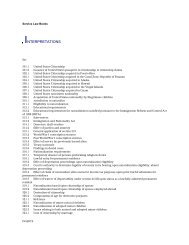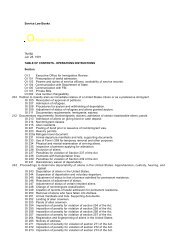You also want an ePaper? Increase the reach of your titles
YUMPU automatically turns print PDFs into web optimized ePapers that Google loves.
<strong>Inspector's</strong> <strong>Field</strong> <strong>Manual</strong><br />
(b) Merchant Seamen. The passport office has determined that the fee for a passport waiver will not be charged<br />
in the case of a bona fide U.S. merchant seaman who has lost his or her documents while outside the U.S.,<br />
provided the seaman's status is reflected in the ships Articles and he or she is returning to the U.S. on board that<br />
vessel. Mark the DS-1423: "Mariner--No Fee" and forward it to the Department of State.<br />
12.6 Other Documentary Evidence.<br />
Other common documents that may help to establish United States citizenship include the following:<br />
1. A Certificate of Naturalization,<br />
2. A Certificate of Citizenship,<br />
3. Citizen's identification cards (Service Forms I-179 or I-197),<br />
4. State Department Certificates of Identity and Registration (Forms FS-225 and FS-225A) [See<br />
22 CFR 50.9.],<br />
5. The United States Coast Guard Mariner's Document indicating U.S. nationality (known as a<br />
Z-card, this document may also be issued to LPRs),<br />
6. Birth Certificate showing a place of birth in the U.S. accompanied by good identification, and<br />
7. Baptismal certificates or other forms of secondary evidence of U.S. citizenship.<br />
Most documented false claims to United States citizenship will be carrying birth certificates, baptismal<br />
certificates, or both. These documents are most easily obtained, altered, or manufactured. A more detailed<br />
discussion of false claims to U.S. citizenship is contained in Chapter 17.<br />
12.7 Loss of Citizenship.<br />
There are various ways in which a citizen of the United States, whether naturalized or native-born, may lose<br />
citizenship. During the course of an inspection, you may have reason to question an applicant for admission<br />
regarding this topic. It is an extremely complex issue, and making such a determination must be carefully and<br />
thoroughly handled. Sections 349 through 357 of the INA specify the ways in which citizenship can be lost.<br />
Service regulations for the corresponding sections and Department of State regulations at 22 CFR 50 provide<br />
information and guidance on the subject. You may find endorsements in U.S. passports which lead to questions<br />
regarding possible loss of citizenship. For example, Great Britain inserts a Certificate of Partiality in a passport<br />
to show the holder enjoys the benefits accorded a British subject. Such a certificate, standing alone, does not<br />
establish an individual's loss of U.S. citizenship. Such evidence should, however, prompt further inquiry by the<br />
inspecting officer.<br />
12.8 Non-Citizen Nationals.<br />
There is a technical distinction between a citizen of the United States and a national of the United States. All<br />
citizens of the U.S. are nationals, but all nationals are not citizens. The term national of the United States is<br />
defined in section 101(a)(22) of the INA, and explained in detail in section 308 of the INA. At present, American<br />
Samoans (including Swains Islanders) are the only United States non-citizen nationals. They will generally<br />
present a Certificate of Identity showing United States nationality, a United States passport, or a birth certificate.<br />
Upon admission, stamp the travel document of any American Samoan or Swains Islander, since these<br />
individuals must establish three months residence in the U.S. for naturalization purposes.<br />
Section 308 also provides for acquisition of nationality at birth outside the United States or American Samoa for<br />
a child born to a national of the United States. Prior to 1986 there was no provision for a child born to one<br />
national and one alien parent. Pub.L. 99-396 (Aug. 27, 1986) amended Section 308 by adding Section 308.4<br />
which provides for acquisition at birth to those born outside of the U.S. or an outlying possession with one alien<br />
parent and one national parent. The amendment was unusual in that it made the change retroactive and<br />
provided that nationality to someone born before the amendment was only acquired when the applicant




